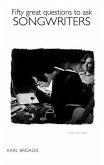War Babies, born 6 months apart on either side of America's belated entry into WWII, the pair came to maturity during a post-war boom, when America enjoyed a consumerist explosion of pre-Cambrian dimensions, accounting for the purchasing of 60% of the world's consumer goods. By 1960, per capita income was 35% higher than in 1945, and 61% of American families were classified as middle-class, as opposed to just 30% during the 1930's. Paul Simon grew up the son of a college professor and his education gave him a particular insight into the humanities and after falling under the spell of the Everly Brothers he moved into folk music, a musical form that allowed a more appropriate place for his humanist/intellectual musings. Brian Wilson was similarly energised by sweet harmonies, specifically the complex and jazz influenced harmonies of The Four Freshman. Wilson took the energy of rock and roll and applied the four part harmony singing of the Four Freshmen and also of the 1950's Doo-Wop groups, a genre equally beloved by Simon.
Simon and Wilson shared a love of music in their upbringings, but that's where the similarities end. Paul's father was a musician, "My daddy was a family bass man", and an academic, but Brian's father was "an asshole, he treated us like shit", according to his brother Dennis. Murry Wilson was a frustrated songwriter, a driven and unforgiving authoritarian who beat his three sons regularly and Brian certainly blamed his father for the fact he was effectively deaf in one ear, as he was told it came from a blow to the head he suffered as a two year old. The teenage Brian may have watched Fred MacMurray, the benign and attentive father in the hit TV series My Three Sons and wondered at the gap between the TV fiction and the brutal reality the three Wilson sons suffered. Murry was a real life, if more violent Willy Loman, an unhappy salesman who took out his frustrations at home. For Paul Simon music was an adventure, for Brian Wilson it was an escape.
The two entered the fray at a good time for music in industry terms, as the growth initiated by the first wave of rock and roll from 1955 to 1960 saw the music industry in the USA increase in net value from $60 million to $205 million and it would increase again by 1965 to $600 million, as Baby Boom teenagers found significant disposable income. For many Americans the anodyne, antiseptic and absurdly prosperous 1950's came to a shattering end, not in 1960 but in 1963, with John Kennedy's tragic assassination and both Simon and Wilson were professional musicians by then. Both men came to prominence within a few short years of each other and even though they were separated by the width of the continent they actually shared a key connection, the Wrecking Crew, Phil Spector's ace session players, who played on several iconic Simon and Garfunkel and Beach Boy tracks.
Paul Simon and Brian Wilson also shared an inquisitive and relentless curiosity about music, both pushing their knowledge and refining their capabilities, rather than rest on their laurels. Paul became an accomplished and virtuoso guitar player and Brian became the last word in stacking and layering vocal harmonies to enrich his compositions.
Dieser Download kann aus rechtlichen Gründen nur mit Rechnungsadresse in A, B, BG, CY, CZ, D, DK, EW, E, FIN, F, GR, HR, H, IRL, I, LT, L, LR, M, NL, PL, P, R, S, SLO, SK ausgeliefert werden.









